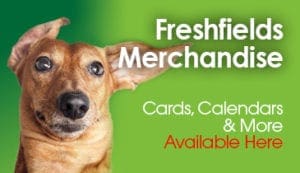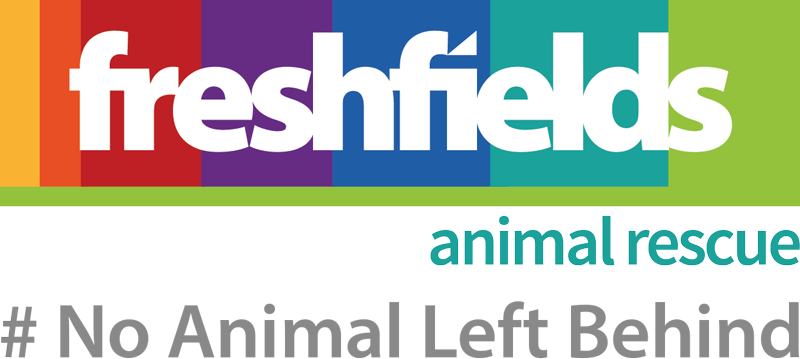Veggie-Vegan Living

Every year in the UK alone, around 1,000 million animals are bred and killed for food.
Most of the 2.7 million that are slaughtered each and every day will have been reared in factory farms and will have lived until just a few months or weeks old. Arguably, the best way to show you care about animals is to stop eating them.
At Freshfields we are passionate about every species of animal including those most commonly used for meat! Our role here is not to preach and it most certainly is not within our remit to judge, as a charity that advocates a meat free diet however it would be remiss of us not to speak up and to highlight the options available for those open to embracing a meat free lifestyle and to…
Making a difference together for All animals!
Benefits of a meat free lifestyle
Benefits for the Animals
Crammed into stinking sheds, farmed animals are given the bare minimum to survive. They will never roam freely, see natural daylight or breathe fresh air and death for them will be both bloody and terrifying. At sea it is no better. Dolphins, whales and turtles whilst non-target animals, are too often caught up in the football pitch sized nets and dragged from the water to suffer a similar fate to the suffocating fish. At the end of long lines and speared on hooks other fish such as Tuna are dragged slowly to their deaths. At the same time certain sea birds face increased danger of starvation as their natural food supply of fish dwindles.
The average meat eater consumes around 11,000 animals (including fish and shellfish) during their lifetime. These sentient, feeling beings are treated as nothing more than a commodity created to generate maximum profit and with no regard for their ability to experience pain, fear, discomfort and distress!
By choosing not to eat animals you help lessen the demand for meat and slaughterhouse by products. By removing demand, profitability decreases and with less profit there is reduced incentive to farm these animals, fish and birds.
If you really care about animals, the best way you can help them is to stop eating them!
Benefits for the Environment
Whilst in Central America, the rainforest is being razed to the ground, primarily to make way for cattle ranching and growing crops to feed farmed animals, in other parts of the world fishing trawlers rake the sea bed destroying entire ecosystems and killing off whole species.
Our friends at ARBTECH have posed the question ‘Can Vegetarianism Save the Planet?’ As they state there is no easy answer, however they also evidence the fact that resources needed to raise animals for food are far above those of vegetables and whilst there is certainly much more to consider, in an overcrowded world where resources are precious we must seriously look at what would happen if we were to reduce our animal intake. Take a look below and decide for yourself.

Benefits to Health
Go veggie for your health!
The evidence is conclusive: we do not need to eat meat to stay fit and healthy! Far from it, a balanced, varied, plant-based diet is actually the healthiest of all so by adopting a meat-free diet, you’ll be doing your health the world of good.
Plant-based foods are naturally high in fiber and low in fat and contain all the nutrients you need. Eating red meat and processed meats can increase the risk of some types of cancer, additionally, meat contains saturated fats, which are a leading cause of heart disease and strokes.
Vegetarians are much less likely to suffer from these diseases and what’s more, the NHS in the UK is clear that a properly balanced vegan diet is a healthy diet for all age groups and for nursing mothers too!
For an additional 20 health benefits of going vegan follow the link HERE
Tips & Guides to help along the way
What is a Vegetarian or Vegan
According to the Vegetarian Society:
A vegetarian is someone who lives on a diet of grains, pulses, nuts, seeds, vegetables and fruits with, or without, the use of dairy products and eggs. A vegetarian does not eat any meat, poultry, game, fish, shellfish or by-products of slaughter.
Also according to the Vegetarian Society there are different degrees of vegetarianism, the four most common forms of which are:
• Lacto-ovo-vegetarian – Eats both dairy products and eggs. This is the most common type of vegetarian diet.
• Lacto-vegetarian – Eats dairy products but not eggs.
• Ovo-vegetarian – Eats eggs but not dairy products.
• Vegan – Does not eat dairy products, eggs, or any other animal product.
Veganism for many is not just about diet, it is very much a lifestyle choice and according to the Vegan Society is best described in the following way:
A philosophy and way of living which seeks to exclude—as far as is possible and practicable—all forms of exploitation of, and cruelty to, animals for food, clothing or any other purpose; and by extension, promotes the development and use of animal-free alternatives for the benefit of humans, animals and the environment. In dietary terms it denotes the practice of dispensing with all products derived wholly or partly from animals.
Ingredients to Avoid
Some beers and many wines are clarified using animal products such as isinglass (obtained from fish swim bladders), other fining agents may include milk products, gelatine, fish oil, egg white, insect shells, blood or bone marrow. Spirit drinks are invariably suitable for vegans.
Many supermarkets label their products if suitable for vegetarians and vegans. Alternatively check out www.barnivore.com or go direct to the manufacturer for the most up to date information.
Animal Fat
Cakes, biscuits and margarines often contain animal fats that are not suitable for veggies or vegans. Suet, dripping and lard are all solid fats from cows, sheep or pigs so when ‘animal fat’ is listed as an ingredient it refers to fat from a dead animal and not a dairy product, so avoid it!
Animal free alternatives are: vegetable suet, dairy free margarine and vegetable oils.
Albumen
Made from egg white and used as a food binder.
Egg free versions are available from good health shops and online.
Cheese
If it’s not labelled ‘vegetarian’ you can pretty much guarantee that it contains an ingredient taken from dead calves’ stomachs. This ingredient is rennet and is used to harden the cheese. Ready meals and processed foods which contain cheese are not always suitable for vegetarians so look carefully for the V symbol before you buy.
All major supermarkets sell vegetarian cheeses these days and some even diary free (vegan) cheeses.
E Numbers
E631 (made from meat and fish), E904 (shellac, from insects), E120 (cochineal, from insects) and E542 (made from animal bones) are all additives not suitable for vegetarians. There are many more such as E471 that may or may not be made from animals.
Try to avoid products that contain lots of E numbers or ensure only non-animal variations have been used.
E322/lecithin
Lecithin is a fatty substance found in egg yolk and blood, it is also found in nerve and other tissues.
Soya lecithin is the veggie alternative. Make sure the ingredient is clearly labelled ‘soya’ or that the product carries the V symbol.
Eggs
Processed foods, cakes and biscuits often contain eggs. Unless labelled ‘free-range’, ‘organic’ or displaying the V symbol it’s almost certain they will have come from caged hens.
Why not try avoiding eggs altogether, there are plenty of vegan options available and loads of recipes available online. If you do want to consume eggs then only buy free range or organic.
Gelling Agents
Gelatine and aspic (made from boiled-up fish and animal bones, skin and ligaments) are understandably to be avoided. These ingredients can often be found in sweets, desserts and yoghurts so you will need to watch out.
Agar, carrageenan and pectin are safe, animal free alternatives.
Lactose
Lactose is a type of sugar commonly used to help flavourings ‘stick’ to crisps. Vegans don’t eat lactose because it is made from milk. Caseine and whey are also milk derivatives and whey is sometimes not even suitable for vegetarians.
To cut these ingredients out altogether choose dairy-free versions of the product you want to buy.
Lanolin
This product comes from sheep’s wool and can be found listed on many cosmetic products. It is generally a slaughterhouse by-product and avoided by most veggies.
Quorn
Although Quorn are currently trialling some vegan products the bulk of their range contains egg white and most also contain milk ingredients. If you are aiming for a purely vegan diet be sure to keep an eye on the packaging.
Why not try a vegan alternative the next time you shop?
Vitamin D3
This version of the D vitamin is derived from fish oils or lanolin (the sheep’s wool extract) so should be avoided by both vegetarians and vegans.
Look out for the vegan version D2
Worcestershire Sauce
Traditional varieties of this sauce often contain anchovies (small fish).
Try a vegetarian Worcester sauce as made by companies such as Granovita, Biona, or Geo Organics.
Tips on Healthy Eating
Vegetarians get their protein from a wide range of foodstuffs, such as tofu [soya bean curd], soya products (milk), cereals (rice, pasta), nuts and seeds and pulses (chick peas, baked beans). Our bodies are getting all the protein needed by eating a normal range of foods and that protein doesn’t come laden with saturated fats, as it does when it comes from dairy products. Protein is in practically every kind of food and it’s almost impossible to eat less than you need.
Just like a vegetarian diet, a vegan diet takes its vitamins from fresh fruit and vegetables. Whilst some vegans take supplements of B12 it is easily possible to supply the body’s needs from dietary sources alone. Green leafy vegetables such as lettuce and other greens like broccoli and spinach supply Vitamins A, C and K as well as B vitamins. Staples like olive oil, tomatoes and nuts supply Vitamin E while fortified foods (like many breakfast cereals and soya milks) provide Vitamin B12 and Vitamin D. Vitamin B12, is also found in yeast extracts like Marmite, it is especially important for vegans as it is not available directly from plant sources and is vital for health.
Products such as tofu, rice, dried apricots and almonds are excellent sources of essential minerals like iron, magnesium and zinc. Vitamin C aids iron absorption and is readily available in a vegan diet. Non-dairy foods including beans, dark green leafy vegetables (eg broccoli, watercress), nuts (especially almonds), seeds (especially sesame) and dried fruits are able to supply calcium which is essential for healthy bones. Bone mineral density also benefits from a vegan diet the maintenance of which is contributed to by a host of assorted fruits and vegetables. As for complex carbohydrates, pasta, cereals and bread supply all we need and fibre comes as standard in a vegan diet.
Vegan nutrition does require a little more thought than being vegetarian but being vegan doesn’t mean becoming obsessive about diet. Whether your choice is to go vegetarian or to go vegan, unless you merely swap one round of junk food for another, your food intake is inevitably going to be healthier.
You can download Freshfields ‘Health-Wise Vitamin & Mineral Chart’
Donate Here
Lost & Found Pets

Merchandise
Exclusive merchandise available direct from the rescue. Don't miss out, follow the link to make your purchase today.


